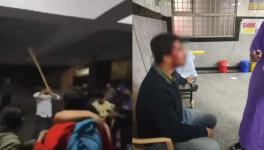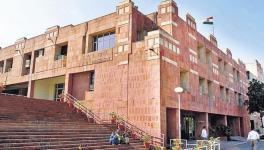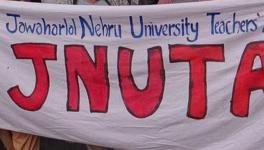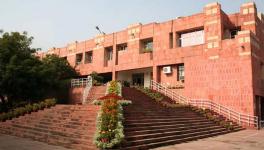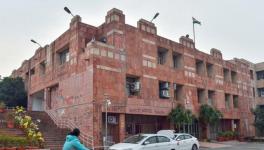UGC Notification: Modi Government’s Another Attack on Education
To throw more light on the UGC Gazette Notification, Newsclick interviewed Saikat Ghosh, Professor, Delhi University.
The May 10th notification of the University Grand Commission (UGC) about the proposed Academic Performance Indicators (API) to ascertain performance of teachers will leave over 5,000 teachers’ jobless in Delhi University itself. Consider what will be the impact of it across the universities across the country. The proposed a system not only reduces the number of permanent teaching positions, leading to a skewed student-teacher ratio but in turn, also affects the quality of teaching that is made available to students by focusing on the quantity instead. It is believed that by introducing such retrogressive amendments to the UGC regulations, this Government is pushing the academic talent of the nation back to the trailing-end of the global knowledge society. The teachers of various universities along with their families marched to raise their voices against this assault.
Rough Transcript:
Pranjal: Hello and welcome to Newsclick. The recent UGC gazette notification has created an uproar in the teaching community. More than 5000 teachers marched yesterday in Delhi. To discuss this issue, we have with us, Saikat Ghosh, former academic council member, Delhi University and also Professor in Khalsa college.
Hello Saikat, As we saw yesterday, more than 5000 teachers marched in from Mandi house to Parliament street, demanding the removal in the API system and roll back of UGC gazette notification. So can you through some light on what is this gazette notification?
Saikat Ghosh (SG): See this gazatte notification is a notification pertaining to the latest set of amendments to the UGC regulations through which our service conditions are primarily governed. Now through this latest set of amendments, which were notified through the gazette of India on 10th May after government approval had been sought, there are some very dangerous features that have come through. The most important and striking them of all is that, this gazette notification provides an insidious basis. for the leave formulation of workload in all universities. That reformulation is going to become possibility because, while defining the direct teaching hours in the workload, the amendment excludes tutorials and undervalue practicals in the science subject, wherein two practicals are going to be countered as equivalent to one lecture. As a result of that, in the current scenario, where tutorials and practicals are included in workload calculation per teacher. If we exclude them, then the workload per teacher goes up. Because the number of lectures that teacher has to teach increases. That is why more work gets absorbed amongst a fewer number of teachers and according to our estimates therefore, it results in a 50% increase in workload per teacher. That means, close to 5000 teachers who are currently employed with Delhi University will be rendered as surplus hands if this kind of workload formula is implemented.
Pranjal: You mean the ad-hoc and guest faculty?
SG : Not just that. Adhoc and guest, permanent teachers. It will depend from institution to institution, sometime subject to subject. But the surplus will affect all categories of teachers. We have recently heard, that even for the permanent employs in the public sector, the government is planning some sort of retrenchment mode. In the sense that, government might asses your performance in a way that, it might conclude that, you are not being able to deliver, what is demanded in terms of an average mean and the government might give you forced voluntary retirement. So all possibilities are open. Because we have seen this governemtn has been gradually nurtureing a very hostile environment towards teachers and academics scenario in general.
Pranjal: So one of the features of this API system or the gazette notification that has come in is students feed back. Can you throw some light on it what is it?
SG: You see, the government is trying to justify student feed back by saying that it is a way of making teacher accountable. Now, as a teacher I do believe that the teacher and teaching practices needs to be accountable. But unfortunately, the student feedback is being linked to promotions to career advancement. Now, we are living in a society which is deeply divided along lines of gender, caste and now religion. Students come from an uncritical background they often don't understand what is of interest to them in the long run. They are often misguided by prejudices and bias that prevails in the society. Now, we fear that this student feed back become a way of reinforcing unwittingly reinforcing the prejudices based on gender, caste and religion. The student feedback can also be sometime manipulated by the authorities to target specific teachers who are vocal and who speak out against establishment and that is why we are totally against the student feedback. Why just student feedback we are against all the features of the API because all of them are anti-teacher and in the larger scenario they are anti-education. So also if you look at it, the direct teaching that you talk about and a total working hour in a week it amounts to about 40 hours per week, a teacher has to be involved in the academic institutions. So that leaves no space for any other work for the teacher itself like development of research or publications or extra curricular activities. Also, it leaves deep impact on a teaching standard itself. Absolutely, as a result of this increasing lecture, a teacher who used to teach on an average 2-3 papers will now have to teach 4-5 papers. That means, the preparation for each paper there is a quantum increase in work and as a result of this the quality of teaching is bound to suffer. Besides that, if the faculty if downsized in the drastic manner there will be a direct effect on the student teacher ratio. Now, the student teacher ratio is a very important determinant in how a university or institution is ranked. The government keeps saying, every year we hear the President of India and MHRD bemoaning the fact that the Indian universities are not making the top ranks in the global rankings. This kind of a move is going to adversely effect our ranking even further. Here, our hands are tied down because all the infrastructure, all the hands are provided by the government posts are sanctioned by the government. So it is the government's responsibility to ensure that the situation prevailing in public funded universities is such that we can honestly and genuinely strive for academic excellence. The government seems to be doing quite the contrary and a result of which higher academic system will suffer irremediable kind of loss.
Pranjal: So even if you are looking at API scoring that the notification provides so it actually makes it impossible for Assistant Professor to get promoted to Associate Professor
SG: You see, it is impossible actually. I will give you an example, in the teaching target itself the maximum points that can be given to a teacher for teaching is 60. Now, how do you arrive at 60. the government has given a formula that you divide the actual number of teaching hours by 10 which means the actual number of teaching hours there are 600 hours per year, 30 weeks of teaching that is. Then a teacher stands to get 60 points. Unless, does not go on leave at all, teachers during weekends, does not go on refresher courses, does not attend research conferences, does not do any kind of extension work only then can a teacher fulfil this 60 points. So it is an impossible kind of a target and just a cursory glance will tell you that this API system is designed in a manner that it will deny promotions and career growths to teachers rather than enable teachers.
Pranjal: So if you look at the current regime itself and the entire attack or assault on academic institutions, it's been growing. The WTO summit that was held last year, it laid the foundation of privatization of the higher education in country itself. So it is a very dangerous trend that we are seeing which is developing in the country.
SG: You see, the gazette notification is a direct consequence of the fact that the government signed on the dotted line in the Nairobi summit of the WTO and committed higher education to the WTO clause. Since then, we have seen a 55 percent slash in the government budget on UGC. The UGC is the main funding agency through which funds to every university public funded university and colleges disbursed. A 55% cut in budget will mean that you are drastically reducing the infrastructure and capacity of the public funded system. In order to do what. In order to obviously promote private shops to flourish because this will be reflected in the decline of quality of education that we impart in public funded universities and only then, the students be forced or will be put through a desperate situation where they will contemplate joining private universities.
Pranjal: So also, when we talk about the private universities, there is also foreign universities that may come into the country. The same BJP opposed the foreign education bill when it was being brought by the UPA2. Now, the same government is trying to bring it through different channels of so called make in India project. So how do you see that?
SG: The difference between the politics of the congress and the BJP in a larger measure, at least in terms of economic policy is just the same politics packaged in a different way. So the BJP is packaging the same politics of the UPA government in a different way. As you rightly pointed out, through make in India and all of that the vision seems to be, I mean we call it lack of vision, a distorted kind of vision is that under globalization. You see, the critical knowledges will be produced by the first world countries, the advanced capitalist nations of the world which are in the West, some of them are in the East too. But the third world countries, the developing countries is where the focus on narrow a very narrow parameter of skilled development will be at the agenda of the government. Now, why is that because the working class, the labour of the global economy will be derived from the developing countries, it seems to be our Prime Minister's vision that forget about funding, the growth of critical knowledges and research. Concentrate on low level skills that will enable most of our aspiring population to go and join the global work force. But in the low grade skill, low end skill level almost as the blue collar worker. So we are again beginning to feed coolies into an imperial system of economy.
Pranjal: Saikat if I am not wrong, you all were among the forefront in the struggle against FYUP. This trend of privatization, the Indian universities were made a laboratory for that and then the regime brings in the .. which is the replica of FYUP. So nothing seems to have changed in terms of these experiments which are going in Indian universities also.
SG: You see, the decision to commit higher education to WTO GATTs regime had come in 2005 with the UPA government. Kapil Sibal has just taken over. It was an oral commitment given to the WTO. Ever since then every year there has been at least one Indo-US higher education summit through which these experiments have been flagged off, they have been green signaled. Year after, year after year during the summer months, we see the government coming up with this distorted agenda of the form which is going to have an immediately chaotic effect on the University system. First, it was the semester system. You see, the government's agenda is to homogenize the Indian education system we said that the semester system may work in certain places and may not work in other places like Delhi University where we see students coming from variable social and economic background and it is not even a residential university. So, the semester system modularized the education in a manner that today teachers are hardly able to spend enough time even on a students. We have to rush through syllabi and every student does not learn on a same pace we must understand. So for those, who undergo learning difficulties, they haven't had the benefits of a top grade schooling, teachers have no opportunity to give them more time or interact with them more because you know we are hard pressed for time because we are teaching in a very modularized and inflexible format. Then came the FYUP through which there was a severe attempt to downgrade the quality of the courses that we teach and to dilute the academic scenario entirely. Fortunately, due to public democratic pressure FYUP was rolled back. Now, as I said, the new government, Modi government repackages the FYUP in a different way slightly tweaks up the causes and introduces the same on a platter. Of course, we hope to as long as we are active, as long as our voices are not entirely silenced, we are speaking against CBCS and we are going to speak out against all these practices that will ultimately have a very destructive effect on public sector higher education.
Pranjal: Saikat you have raised a very important point of homogeneity. If you look at the current regime the way it has been changing the course structures in different universities across India, it is dangerous trend to homogenize the entire idea of education and push to a specific agenda of the Rashtriya Swayam Sevak Sangh. It is pushing students to an agenda of Hindu Rashtra. It is also a very dangerous trend.
SG; Well, it is a dangerous trend but it is understandable because in this government the ideology of the Hindu Rashtra is a viable ideology only because it is an undemocratic ideology. It is an ideology which does not allow the common citizen to speak out as a matter of right, how to criticize the state, how to criticize the authorities. Okay, it is an ideology of hierarchy which is not in consonance with the time that we are living. This ideology, they are trying to revive it and they are trying to force it down our throats precisely because it helps them, curb on democracy, suppress democratic aspirations as I say and follow their ultimate agenda which is an imperialist agenda, which is an agenda dictated by powerful financial and commercial lobbies in the world.
Pranjal: So if we summarize all of this, it looks like it's the agenda of the current regime to bring in social fundamentalists and economic fundamentalist forces together on the same path. What do you see? What is the way forward?
SG: The way forward is at least as far as a teacher, I can say that the way forward is to educate and not merely confine our education to our traditional class rooms or to institutions of learning but go beyond that. Every teacher has to, every teacher is interested in defending democracy against this kind of an assault has to go beyond the traditional institutions out into the streets and through movements connect to the people, through an intelligent use of media connect to the people and educate the people about this assault on democracy because it is only in the people's resolve to resist this assault that we have some hope. Otherwise, in the foreseeable future we might have a totalitarian regime which is comparable to those other totalitarian regimes of history symbolized by people like Hitler, Mussolini and so on and so forth.
Pranjal: That's a very positive note to leave on Saikat. I will be coming back to you on such issues. Thanks a lot.
DISCLAIMER: Please note that transcripts for Newsclick are typed from a recording of the program. Newsclick cannot guarantee their complete accuracy.
Get the latest reports & analysis with people's perspective on Protests, movements & deep analytical videos, discussions of the current affairs in your Telegram app. Subscribe to NewsClick's Telegram channel & get Real-Time updates on stories, as they get published on our website.









